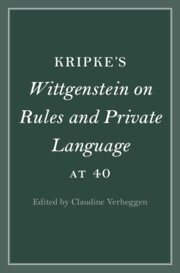Book contents
- Kripke’s Wittgenstein on Rules and Private Language at 40
- Cambridge Philosophical Anniversaries
- Kripke’s Wittgenstein on Rules and Private Language at 40
- Copyright page
- Dedication
- Contents
- Contributors
- Acknowledgments
- Introduction
- 1 Kripke’s Wittgenstein’s Skepticism about Rules and Meaning
- 2 Putting Wittgenstein Back into Kripkenstein:
- 3 Answering Kripke’s Skeptic
- 4 Wittgensteinean Notions of Uniformity and Kripkensteinean Skepticism
- 5 Wittgenstein’s Naturalism and the Skeptical Paradox
- 6 Kripke and Wittgenstein on Rules and Meaning
- 7 Semantic Normativity, Properly So Called
- 8 What Is the Skeptical Problem? Wittgenstein’s Response to Kripke
- 9 How Not to Brush Questions under the Rug
- 10 Quadders and Zombies
- 11 Communitarianism, Interpersonalism, and Individualism in Kripke’s “Skeptical Solution”
- 12 “Considered in Isolation”
- 13 The Meaning of Meaning Ascriptions
- Bibliography
- Index
3 - Answering Kripke’s Skeptic
Dispositions without ‘Dispositionalism’
Published online by Cambridge University Press: 22 February 2024
- Kripke’s Wittgenstein on Rules and Private Language at 40
- Cambridge Philosophical Anniversaries
- Kripke’s Wittgenstein on Rules and Private Language at 40
- Copyright page
- Dedication
- Contents
- Contributors
- Acknowledgments
- Introduction
- 1 Kripke’s Wittgenstein’s Skepticism about Rules and Meaning
- 2 Putting Wittgenstein Back into Kripkenstein:
- 3 Answering Kripke’s Skeptic
- 4 Wittgensteinean Notions of Uniformity and Kripkensteinean Skepticism
- 5 Wittgenstein’s Naturalism and the Skeptical Paradox
- 6 Kripke and Wittgenstein on Rules and Meaning
- 7 Semantic Normativity, Properly So Called
- 8 What Is the Skeptical Problem? Wittgenstein’s Response to Kripke
- 9 How Not to Brush Questions under the Rug
- 10 Quadders and Zombies
- 11 Communitarianism, Interpersonalism, and Individualism in Kripke’s “Skeptical Solution”
- 12 “Considered in Isolation”
- 13 The Meaning of Meaning Ascriptions
- Bibliography
- Index
Summary
Saul Kripke famously raised two sorts of problems for responses to the meaning skeptic that appealed to how we were disposed to use our words in the past. The first related to the fact that our “dispositions extend to only finitely many cases” while the second related to the fact that most of us have “dispositions to make mistakes.” The second of these problems has produced an enormous, and still growing, literature on the purported “normativity” of meaning, but the first has received (at least comparatively) little attention. It will be argued here, however, that (1) the fact that we can be disposed to make mistakes doesn’t present a serious problem for many disposition-based responses to the skeptic, and (2) considerations of the “finiteness” of our dispositions point, on their own, to an important way that the relation between meaning and use must be understood as “normative.”
- Type
- Chapter
- Information
- Publisher: Cambridge University PressPrint publication year: 2024
- 1
- Cited by

